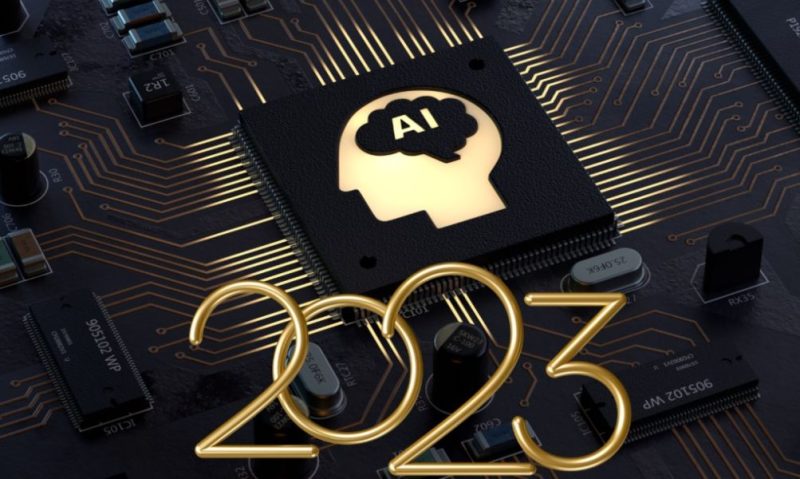AI In 2023: A Year Of Innovations And Advancements

Categories :
2023 has essentially been the year of Artificial intelligence (AI). With significant advancements in chatbots and virtual assistants to self-driving cars and automated industrial machinery, here is how it is going to affect every human thing in 2024.
According to research by IDC, global expenditures by governments and businesses on AI technology are projected to surpass $500 billion in 2023. This substantial investment prompts contemplation on the utilisation and ramifications of AI.
Here are some of the pivotal trends that are going to shape the humanity and its future:
AI in 2023: Innovative advancements
From the debut of cutting-edge large language models (LLMs) to the innovative Humane AI Pin and the awe-inspiring creation of an entirely new Beatles song, this year has demonstrated AI's rapid evolution and expansive reach. AI has now integrated itself into the fabric of our lives, shaping our technology and profoundly impacting our culture and the arts.
PyTorch 2.0's release set a new industry standard, offering robust tools to researchers and developers, while Nvidia's Modulus and Colossal-AI's PyTorch-based framework contributed to an enriched open-source ecosystem. Tech giants Microsoft and Google played pivotal roles, with Microsoft integrating ChatGPT into Bing and Google unveiling Bard.
However, the open-source AI landscape was not without controversy. Meta's release of Llama 2 as "open source" triggered debates on the definition of open source in AI. Although seen as a substantial contribution, concerns arose about Llama 2's scalability limitations, prompting discussions on the need to redefine licensing models for AI.
Concurrently, 2023 marked the rise of advanced generative AI models that reshaped natural language processing and creative content generation. OpenAI's GPT-4, a groundbreaking language model, demonstrated exceptional proficiency in text-based applications, excelling in creative writing, coding, and complex problem-solving.
Models like Jina AI's 8K Text Embedding Model and Mistral AI's Mistral 7B showcased the AI community's increasing expertise in handling extensive textual data.
AI in 2023: Policies and geopolitics
The Biden-Harris Administration took proactive steps to promote responsible AI innovation, emphasising fairness, transparency, and accountability. These initiatives aimed to position the US as a leader in establishing global standards for ethical AI.
The US and China intensified their investments in AI research and development, with the US maintaining its innovative edge, while China focused on building AI infrastructure and widespread implementation. Both nations considered AI a vital component of national security, incorporating it into defense strategies, raising concerns about a potential AI arms race.
The US sought to set global norms for AI, including the proposal of an AI Bill of Rights. In contrast, China adopted a more state-centric approach, influencing international AI governance discussions and reflecting ideological differences.
These European nations advanced their AI regulation and funding efforts, recognising the importance of robust frameworks aligned with ethical principles in AI technology development.
The EU played a leading role in AI regulation through deliberations on the AI Act, aiming to establish global benchmarks for ethical AI. This involved a focus on transparency, accountability, and ethical considerations. While contributing significantly to global AI standards, the EU addressed concerns about the impact of regulations on open-source AI development, particularly for large models and frameworks. Ongoing discussions highlighted the need to balance innovation with privacy and human rights, leading to amendments in the AI Act. Internationally, entities like the United Nations engaged in dialogues on AI's global ethical impact through the formation of a new advisory body.
The ingression of AI in 2023 across different verticals of business
While AI-powered tools like PathAI's system significantly improved cancer detection rates, platforms like Atomwise expedited the identification of potential therapeutics.
The finance industry continued its AI-driven evolution, employing algorithms for precise trading decisions, as seen with Virtu Financial. AI-powered fraud detection solutions, exemplified by Forter, strengthened financial institutions' capabilities to combat fraudulent transactions.
Companies like Tesla and Waymo led advancements in autonomous vehicles. Tesla's Full Self-Driving (FSD) system received crucial updates, moving closer to autonomous driving capabilities. Waymo expanded its autonomous ride-hailing service, pushing the boundaries of self-driving technology.
The education sector embraced AI for personalised learning experiences. Platforms like Coursera and edX utilised AI to recommend courses and adapt content, enhancing the online learning experience. AI-driven assessment tools, exemplified by Proctorio, aimed to maintain academic integrity in online exams.
AI played a pivotal role in addressing climate change, with platforms like ClimateAI leveraging AI to improve climate predictions. AI-driven energy management systems, such as Verdigris, optimized energy consumption in buildings, contributing to sustainability goals.
AI-driven cybersecurity solutions gained prominence in defending against evolving threats. Darktrace's platform offered real-time threat detection and response, fortifying cybersecurity postures. Qualys showcased AI-powered vulnerability scanners, aiding in proactively identifying and patching security vulnerabilities.
Significant breakthroughs occurred in AI research, with DARPA's investments aiming to enhance the understandability and transparency of AI systems. OpenAI's collaborations with academic institutions fostered collaborative AI research endeavors.
AI-driven art and music gained attention, with NFTs disrupting the art world. Companies like Aiva and Artbreeder offered AI-generated NFTs, prompting reflections on art and authorship. A US judge ruled that AI-generated artwork can't be copyrighted.
The $699 Humane AI Pin represented a notable development in wearable technology, blending fashion and tech with advanced AI-driven functionalities. It signaled a move toward "smart fashion" and raised concerns about privacy and data security.
The release of "Now and Then," a new Beatles song, showcased AI's role in extracting John Lennon's voice from an old demo. This marked a milestone in AI-driven music production, opening possibilities for posthumous collaborations and reinterpretations of classic tracks.
Anticipating the AI in 2024
Contemplating the evolutionary landscape of AI throughout the transformative year of 2023, it becomes apparent that the potentialities offered by this technology are both extensive and intricate. As we peer into the future, our central challenge rests in the conscientious utilization of AI's power, ensuring its role as a positive force and a continued catalyst for innovation that augments the well-being of all of humanity. Stay tuned for our special insights on AI in 2024, that brings trends that are going the shape the innovation landscape of the future.

Pallavi Singal is the Vice President of Content at ztudium, where she leads innovative content strategies and oversees the development of high-impact editorial initiatives. With a strong background in digital media and a passion for storytelling, Pallavi plays a pivotal role in scaling the content operations for ztudium’s platforms, including Businessabc, Citiesabc, and IntelligentHQ, Wisdomia.ai, MStores, and many others. Her expertise spans content creation, SEO, and digital marketing, driving engagement and growth across multiple channels. Pallavi’s work is characterised by a keen insight into emerging trends in business, technologies like AI, blockchain, metaverse and others, and society, making her a trusted voice in the industry.









